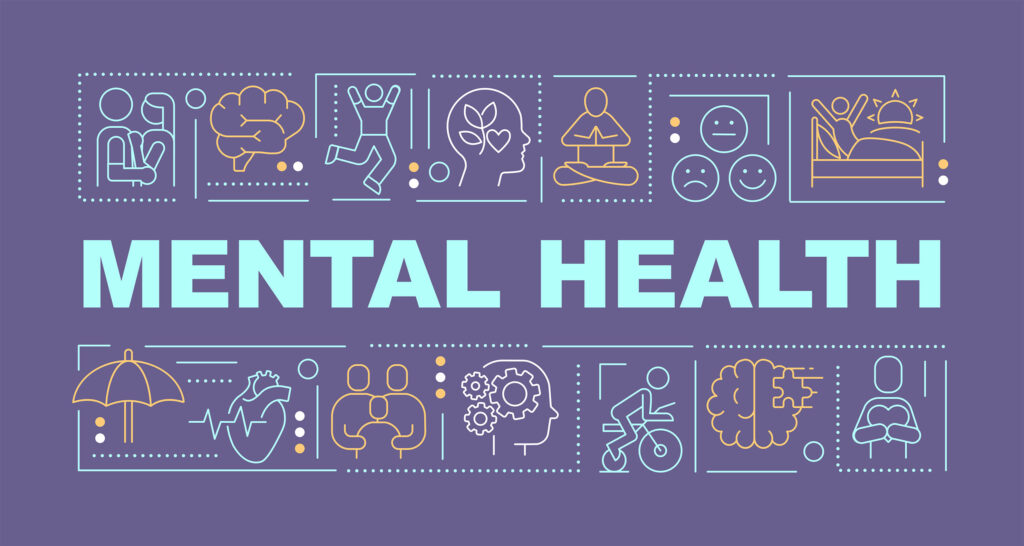Opening the Secrets of Mental Wellness: A Summary of Counseling and Therapy Choices
Mental health and wellness is a facility and essential aspect of total health. Countless therapy and therapy options exist to address numerous emotional difficulties. Each approach offers distinct benefits and techniques customized to private requirements. Recognizing these alternatives is vital for anybody looking for to enhance their mental wellness. Couples Therapy. What elements should one consider when discovering these opportunities? The response may expose a course to a healthier emotional state
Recognizing Mental Health And Wellness and Its Value
Psychological health incorporates the emotional, psychological, and social health of people, significantly influencing just how they believe, really feel, and act. Its value can not be overemphasized, as it influences every facet of life, including partnerships, work performance, and general lifestyle. People with good psychological health and wellness tend to cope with stress and anxiety better, preserve much healthier connections, and make informed decisions. On the other hand, inadequate mental health can result in psychological distress, damaged functioning, and various mental illness, which may require expert treatment. Recognizing psychological wellness is essential for identifying the signs of distress and the requirement for assistance. Understanding additionally promotes empathy and lowers preconception, motivating individuals to seek aid when necessary. By prioritizing mental wellness, neighborhoods can cultivate atmospheres that support emotional wellness, eventually causing much healthier, much more resilient people. This structure acts as a vital step toward effective psychological wellness therapy and therapy choices.
Sorts Of Therapy Methods
Therapy techniques differ commonly, each tailored to satisfy the one-of-a-kind demands of people seeking support. Amongst one of the most usual types are cognitive-behavioral treatment (CBT), which concentrates on identifying and changing unfavorable thought patterns, and person-centered treatment, which emphasizes compassion and approval. Psychodynamic treatment checks out unconscious procedures and past experiences to recognize present actions, while solution-focused quick treatment aims to determine solutions instead of explore problems.Additionally, family members therapy addresses relational dynamics and interaction within family members, cultivating healthier interactions. Group therapy supplies a common room for participants to share experiences and support one an additional. Various other methods consist of existential therapy, which urges people to find significance and objective, and art or songs therapy, which uses innovative expression as a restorative tool. Each strategy supplies distinct techniques and viewpoints, permitting customers to discover the most suitable approach for their personal growth and recovery journeys.
Exploring Different Therapy Techniques
In the domain of psychological wellness counseling, different treatment methods provide distinctive techniques to therapy. Cognitive Behavioral Treatment emphasizes the link in between thoughts and habits, while Psychodynamic Therapy discovers subconscious impacts on emotional health. Additionally, Mindfulness-Based Techniques promote present-moment awareness as a way to enhance psychological law and general psychological health.
Cognitive Behavior Treatment
Cognitive Behavior Modification (CBT) attracts attention as one of the most commonly exercised and investigated techniques in mental health therapy. This approach focuses on the interconnection in between sensations, actions, and thoughts, highlighting that changing negative idea patterns can lead to enhanced emotional health and behavioral modifications. CBT is structured, generally involving a limited variety of sessions, and aims to equip people with functional skills to handle their signs. It is reliable for a selection of conditions, including stress and anxiety disorders, anxiety, and trauma. By using strategies such as cognitive restructuring and exposure therapy, CBT cultivates resilience and encourages customers to challenge obstacles head-on, making it a valuable alternative in the landscape of mental wellness therapies.
Psychodynamic Therapy Approaches
Psychodynamic treatment strategies use a deep exploration of the unconscious mind and its impact on actions and emotional wellness. Rooted in Freudian theory, these techniques highlight the importance of early youth experiences and unconscious problems. With techniques such as totally free organization, desire evaluation, and transfer, individuals get insight right into their sensations and thoughts, fostering self-awareness and understanding. This restorative technique encourages customers to uncover repressed emotions and unresolved concerns, which can be crucial in resolving existing emotional obstacles. By examining the interaction in between existing behaviors and past experiences, psychodynamic therapy intends to promote psychological recovery and individual development. Ultimately, it supplies a framework for people to explore complex internal characteristics that influence their psychological wellness.

Mindfulness-Based Methods
While traditional therapies commonly concentrate on previous experiences, mindfulness-based strategies prioritize present-moment recognition as a pathway to psychological health. These approaches, consisting of mindfulness-based cognitive therapy (MBCT) and mindfulness-based anxiety decrease (MBSR), urge individuals to involve fully with their thoughts and sensations without judgment. Practitioners learn to observe their frame of minds, fostering a greater understanding of emotional triggers and reactions. This method not just alleviates signs and symptoms of stress and anxiety and clinical depression however additionally boosts overall mental resilience. By incorporating mindfulness exercises, such as meditation and deep breathing, clients grow a sense of peace and clarity. Inevitably, mindfulness-based techniques encourage individuals to navigate life's challenges with boosted awareness and approval, advertising a healthier relationship with their feelings and ideas.
The Function of a Specialist or Therapist
A knowledgeable therapist or counselor plays a vital role in sustaining individuals through their psychological wellness trips. They provide a secure, non-judgmental area where clients can share their feelings and ideas honestly. Couples Therapy. By employing different healing strategies customized to each person's needs, therapists assist customers discover underlying problems that might add to their mental health and wellness challenges.Therapists supply support and tools to deal with stress, stress and anxiety, clinical depression, and other emotional difficulties. Their training outfits them to acknowledge patterns in actions and thought processes, facilitating understandings that result in individual development. They likewise promote a solid therapeutic partnership, which is essential for effective outcomes.Moreover, therapists continue to be committed to confidentiality and ethical criteria, ensuring a relying on setting. Inevitably, the duty of a specialist or therapist is to equip people, urging them to establish durability and much healthier coping methods while steering with life's complexities
How to Pick the Right Therapy or Treatment Alternative
Picking the appropriate therapy or treatment option starts with evaluating specific needs. It is important to recognize personal challenges and objectives before discovering numerous treatment styles. This foundational step can greatly influence the effectiveness of the picked strategy.
Evaluate Your Demands

How can individuals successfully analyze their mental health and wellness requires when assessing therapy or treatment choices? They should show on their psychological state and recognize certain concerns, such as partnership, anxiety, or clinical depression challenges. Journaling Bonuses can be a valuable device for tracking thoughts and sensations over time. In addition, people may benefit from seeking comments from trusted close friends or family members regarding viewed changes in habits or mood. It is additionally valuable to review personal goals for treatment, such as boosting coping abilities or acquiring insight into personal patterns. Looking into numerous therapy modalities and their suitability for certain demands can help in making an informed choice. Eventually, self-awareness plays a critical duty in selecting the right path for psychological health support.
Discover Treatment Designs
While going across the diverse landscape of therapy options, individuals need to take into consideration numerous designs of counseling to locate the very best suitable for their distinct needs. Cognitive Behavioral Treatment (CBT) concentrates on altering negative thought patterns, while you can look here Psychodynamic Treatment discovers subconscious procedures and previous experiences. Humanistic strategies highlight individual development and self-actualization, cultivating an encouraging environment. Furthermore, mindfulness-based therapies cultivate present-moment recognition, helping emotional policy. For those seeking structure, Solution-Focused Brief Therapy targets certain goals and options. Group therapy offers a common setup for shared experiences and assistance. Eventually, individuals should mirror on their preferences, comfort degrees, and certain difficulties, guaranteeing they choose a restorative style that reverberates with their personal trip towards mental wellness.
Getting Over Barriers to Seeking Assistance

The Benefits of Counseling and Treatment for Psychological Health
Looking for help for mental health and wellness obstacles can result in considerable enhancements in general well-being. Counseling and therapy give people with a safe space to explore their thoughts and sensations, fostering self-awareness and individual growth. These professional services furnish clients with dealing techniques and analytic abilities customized to their one-of-a-kind situations.Moreover, therapy can minimize signs of anxiety, depression, and other mental health and wellness disorders, improving psychological strength. Normal sessions advertise responsibility and encourage read this people to establish and achieve individual objectives. Through numerous healing modalities, such as cognitive-behavioral therapy or mindfulness techniques, clients find out to reframe unfavorable ideas and develop much healthier behaviors.Additionally, the restorative partnership itself can be a resource of support, assisting to battle seclusion and isolation. Overall, participating in therapy and therapy is an aggressive action toward attaining psychological wellness, making it possible for individuals to lead more meeting lives.
Regularly Asked Questions
Just How Lengthy Does Therapy or Treatment Generally Last?
The duration of therapy or therapy differs considerably, often lasting from a couple of sessions to a number of months or years. Factors affecting this consist of the individual's particular needs, the kind of therapy, and restorative objectives.
What Should I Anticipate During My Initial Session?
During the very first session, people can anticipate an intro, conversation of problems, and the therapist's approach. They might finish analyses and develop objectives, promoting a risk-free environment for open interaction and structure relationship.

Exist Any Risks Related To Treatment?
Therapy can entail threats, such as psychological discomfort, vulnerability, or challenging agonizing memories. While these difficulties may emerge, they can likewise result in individual development and healing, making the therapeutic process complicated yet possibly rewarding.
How Can I Inform if My Therapist Is a Good Fit?
Establishing if a therapist is an excellent fit entails reviewing comfort, communication design, and healing strategy. Positive connection and development towards goals are indications of a suitable suit, essential for efficient mental health assistance.
Will My Insurance Coverage Cover Counseling or Therapy Sessions?
Establishing insurance policy coverage for therapy or treatment sessions typically calls for contacting the insurance provider directly. Plans vary significantly, so people should verify benefits, co-pays, and any kind of required pre-approvals prior to pursuing treatment solutions. Amongst the most common types are cognitive-behavioral treatment (CBT), which focuses on recognizing and altering negative thought patterns, and person-centered therapy, which stresses compassion and acceptance. Psychodynamic treatment explores subconscious procedures and previous experiences to comprehend existing behavior, while solution-focused brief treatment intends to identify remedies instead than check out problems.Additionally, household therapy addresses relational characteristics and interaction within families, fostering much healthier communications. Other techniques include existential therapy, which motivates individuals to find meaning and purpose, and art or music therapy, which utilizes creative expression as a therapeutic device. Cognitive Behavioral Treatment emphasizes the connection between ideas and behaviors, while Psychodynamic Treatment explores subconscious impacts on emotional well-being. Cognitive Behavior Treatment (CBT) focuses on altering unfavorable idea patterns, while Psychodynamic Treatment discovers previous experiences and unconscious procedures.